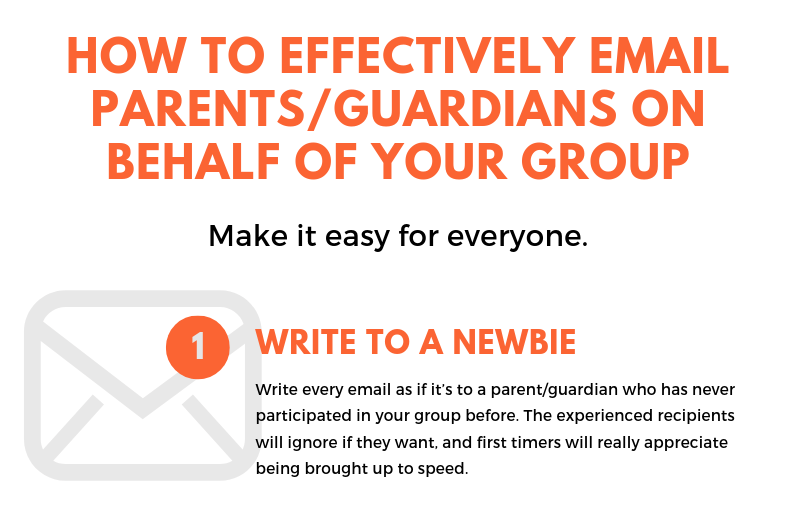One of the most frustrating things I experience as a parent is when groups and organizations don’t tell us what we need to know when we need to know it.
As a writer, this is in my professional wheelhouse. Driven by frustration more than anything, I’ve volunteered to help with communications for a wide variety of groups over the years, and I’ve learned a lot about how to do it well. I’m not the only one who’s easily frustrated by not having the information I feel I need, but I’ve also learned that effective communication can do so much more than simply keep people in the know. Great emails and newsletters can bring parents and guardians together so they can support each other and form friendships, and they can provide a window into the group that inspires some of them to become volunteers, themselves.
So I just wrote my first proper Twitter thread with some simple ways to effectively communicate with parents and guardians. Then I posted it on Facebook and someone said she’d want it as a pamphlet, so I put it into an infographic format. It seems like it’s striking a chord, so now here it is on my website for easier sharing (see below for the graphic version, and for a downloadable PDF).
If you’re tasked with communicating with parents and guardians on behalf of an organization, club, team or group of any kind, here are some tips for doing it effectively:
Write to a newbie. Write every email as if it’s to a parent/guardian who has never participated in your group before. Experienced recipients will ignore you if they want, and first timers will really appreciate being brought up to speed.
2. Assume they don’t know. Assume that no one you’re writing to knows what you know. Assume they want and need to know what you know, and tell them.
3. Be explicit. Lay out time commitments, provide relevant addresses and dates/times of major events, spell out volunteer expectations and demands on their children.
4. Include the why. Always explain why parent/guardian help is important or even essential to the functioning of your group and to their children’s experience. Including the why makes it easy for parents/guardians to meet the group’s needs. (“Why” does not = simply stating that their help is important. “Why” = actually explaining why and how it is important, even if what’s needed is as simple as making sure kids are dropped off and picked up on time.)
5. Respect parents’ time. Parents/guardians are juggling their kids’ schedules, their work obligations, their family needs, and more. Give them everything they need so they can make room for your group in their lives, especially if you’ll rely on them to volunteer.
6. Make it fun. Provide easy opportunities for parents/guardians to connect with each other and you will strengthen your group in all kinds of ways. Happy, engaged parents make your job so much easier.
7. Assume it’s hard. Write as if all parents/guardians have less time than you, less help than you, more struggles than you.
8. Say thank you. Finally, thank parents/guardians early, and thank them often. They may be moving mountains without you knowing so they can keep their kids involved with your group.
A friend Andrea added the following two points to my initial list, too:
Consider whether you would accept cash or in-kind donations, because some people have very scarce time and it can be quite privileged to set things up so that they depend on devaluing the time of (often women) volunteers or necessitating a second adult who has time to do all this stuff.
And note that you can work out options for parents of kids with disabilities, single parents and parents with extenuating family situations. A lot of volunteer commitments might sound easy for most people, but a single parent with a child with disabilities may simply not be in a position to wrangle their child and sell hot dogs or raffle tickets at the same time and the meltdown later may be excruciating. Some parents can barely make it to the field or the troop and are already doing a huge amount of invisible labour. Offer other ways of volunteering too.
Andrea Coutu
Download the List


Thank you Kim. As a middle school teacher and librarian, I rely on volunteers to run the library before school and during lunch. One thing I would add is giving parents a contact number for last minute changes in plans. It cuts down on no-shows if they know it’s important to communicate and you make it easy with a number to text. I have my volunteer staff text me at our first meeting of the year so we can add each other as contacts. I know this isn’t relevant to everyone, but it’s been a game changer with my small army of book loving parents.
Ps I love what you do. Thank you for doing it!